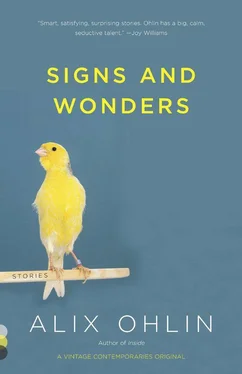Alix Ohlin - Signs and Wonders
Здесь есть возможность читать онлайн «Alix Ohlin - Signs and Wonders» весь текст электронной книги совершенно бесплатно (целиком полную версию без сокращений). В некоторых случаях можно слушать аудио, скачать через торрент в формате fb2 и присутствует краткое содержание. Год выпуска: 2012, ISBN: 2012, Издательство: Random House, Inc., Жанр: Современная проза, на английском языке. Описание произведения, (предисловие) а так же отзывы посетителей доступны на портале библиотеки ЛибКат.
- Название:Signs and Wonders
- Автор:
- Издательство:Random House, Inc.
- Жанр:
- Год:2012
- ISBN:9780307948649
- Рейтинг книги:3 / 5. Голосов: 1
-
Избранное:Добавить в избранное
- Отзывы:
-
Ваша оценка:
- 60
- 1
- 2
- 3
- 4
- 5
Signs and Wonders: краткое содержание, описание и аннотация
Предлагаем к чтению аннотацию, описание, краткое содержание или предисловие (зависит от того, что написал сам автор книги «Signs and Wonders»). Если вы не нашли необходимую информацию о книге — напишите в комментариях, мы постараемся отыскать её.
Signs and Wonders — читать онлайн бесплатно полную книгу (весь текст) целиком
Ниже представлен текст книги, разбитый по страницам. Система сохранения места последней прочитанной страницы, позволяет с удобством читать онлайн бесплатно книгу «Signs and Wonders», без необходимости каждый раз заново искать на чём Вы остановились. Поставьте закладку, и сможете в любой момент перейти на страницу, на которой закончили чтение.
Интервал:
Закладка:
“I only got frostbite in one foot,” he said. “So that’s an upside.”
“It’s good to stay positive,” I said.
Just as quickly as it had arrived, his manic mood left and his grin evaporated. His green eyes were steady. “You could really do me a favor, you know,” he said. “Man to man.” He didn’t say anything else. He cocked his head in the direction of his backpack.
I knew he probably had a whole pharmacy in there. He’d been at the VA hospital in Wilkes-Barre, and they were trying out some new meds, seeing if they could control his pain any better. Stephanie had told me she was hopeful it was going to work, but she said this every time, about each new treatment and every fresh promise from Alan. At work, I’d seen her treat patients with cool professionalism, helpful as she could be, distant as she needed to be. With her brother, it was always going to be different.
“Help me out, Doctor Tom,” he said.
He had that deadpan expression, but it wasn’t disguising some flash of humor. It was just dead. “Please,” he said.
I picked up his backpack and placed it on his bed. It was heavy, and I didn’t ask what was in it. I brought him some water, then turned off the light and closed the door behind me. The hallway was deserted, and I found Stephanie and took her down to the lobby and made her drink a cup of coffee, keeping her down there as long as I could. The nurses went to check on him, but not in time.
I’d been a doctor for less than a year.
I wouldn’t say he looked peaceful. I would say he looked shrunken, and ill-used, and older than his age, which was twenty-six.
I held Stephanie in my arms while she cried. I knew then, feeling her lean into me, feeling my own sadness catch fire from hers, that I loved her, and wanted to marry her, and I stored this feeling away in my heart for a happier day, assuming that we would get to one eventually.
There was a small service, at which Alan and Stephanie’s mother cried dryly, hopelessly, and Ludo gave the eulogy. He said Alan had saved his life by walking in front of him one day, that otherwise, he would have been the one who got injured. “It sucks,” he said.
After the first week, Stephanie didn’t cry all that much. She threw herself into work, double and even triple shifts; she would have worked even more if rules hadn’t forbidden it. In the evenings she cooked for me and ate very little herself, and I tried to be there for her, to listen if she wanted to talk, to hold her at night when she turned to me. On weekends we went on walks, and to the movies. Once, we went to Atlantic City and drank too much and gambled and slept together, and when she smiled for what seemed like the first time in months, I began to feel the clouds parting around us.
Then one night I came home at six and Stephanie was lying on the couch sobbing violently, her shoulders shaking with the force of it. I got her a tissue and she blew her nose into it, honkingly.
She sat up, her knees pulled up to her chin like a child. “It just sort of hit me,” she said, “that he’s never coming back.”
There was nothing I could do to comfort her. She wouldn’t let me touch her. I wondered if on some level she knew, or suspected, what I’d done. “Leave me alone,” she kept saying, and she sounded just like her brother. I left the house, drove around for a while, stopped at a bar. I started thinking about my old life in Philadelphia, the friends I had there, and the women I’d known, and it seemed like I’d been under some kind of spell, living an unreal life. I had these thoughts, but when I got back to the condo, Stephanie had composed herself. She fixed us each a drink. “I’m sorry,” she said. “It’s just so hard.”
“I know,” I said.
I put my arms around her, and we sat together on the couch. She leaned against my shoulder, her hair brushing my chin. I looked out the window at the half-empty subdivision. No lights showed in the houses nearby, and the blackness of the street blended into the inky night. There was no horizon. It reminded me of the story Alan had told me, about not being able to tell the difference between sand and sky. It sounded almost beautiful to me, to be lost for a moment like that, with no one to tell you which way was up.
Robbing the Cradle

They were making a baby. They were going about it in the traditional way. In a ceremonial moment, Lisette put her birth-control pills away in a shoe box that she then buried in the back of the bedroom closet, underneath the silver pumps she wore only to weddings. She had loved Dan for five years, two of them as his wife, and would have said, if asked, that she couldn’t possibly love him any more than she already did. But this turned out to be false; what had come before was only a beginning, a small green bud. Now that they were planning a family, a new tenderness grew between them, sweet but not spineless, because it was also taut with possibility. When he held her, when he lingered on top, inside her, his light sweat sticking to her belly, when he came, sex itself seemed entirely different. It was wonderful and terrible and holy, to be in love and to know there will soon be a person in the world embodying that love. Half of each of you, combined.
Fueled by this intense, thrilling notion, they had sex all the time. In the supermarket, they held hands. In the evenings, when Lisette was at work with the youth orchestra, running the teenagers through Tchaikovsky, she ached for her husband, for his hair and smell and skin. Thinking about him, wanting him, she found a sensual component, if not sexual, in the stroke of a bow across a cello’s wide flank, a kiss to the lip of a flute. Everything was a body, everything seemed ripe. The kids, who were between fifteen and eighteen, braced, head-geared, rippled with acne and coltish energy, used to both annoy and entertain her. They’d gotten along well, joking and teasing and even liking one another. But now she felt maternal. She was nicer, more patient, and physical, too — a little pat on the shoulder or brush of the arm letting them know how special they were. There was nothing inappropriate in it. Her energy was all for Dan, and what brimmed over was just extra caring and love. Sensing this, the kids responded. Instead of complaining about the Tchaikovsky being too hard, or hating the modern pieces (which is what they usually did at the start of the season, so that by the time the Christmas concert came around they’d be sure to score major victories in technique and sophistication), they bent their heads and practiced, practiced, practiced.
When Dan came home from work each afternoon — he taught math at the same high school where she rehearsed — they made love before dinner, in between his day and hers. It was like being newlyweds all over again. Sometimes, Lisette thought back to their wedding day, when she’d felt a squeeze in her chest so strong she’d almost thought it might be a heart attack. She and Dan had exchanged vows in front of all their friends and family, then leaned close and whispered a private vow just to each other, something no one else could hear. These days were like that moment all over again: they moved inside a rosy cloud, a bubble of promise, the family-to-be.
This went on for a year.
Each month she expected to get pregnant, and each month she didn’t. She couldn’t understand it. She was young, healthy, ready. By the sixth month, she started to think of her period using her grandmother’s antiquated term. The curse. She paid more and more attention to the slightest shifts in her body’s chemistry, its devious ecosystem of hormones and blood, tending to it even as it steadily let her down. She took vitamins, supplements, evening primrose, folic acid. She became an expert in ovulation and cervical mucus. She gauged, with a scientist’s exactitude, the swell of her breasts, the frequency of her tears, all the symptoms that presaged another failed attempt. When the curse came, relentlessly punctual every month, she would lock herself in the bathroom and cry.
Читать дальшеИнтервал:
Закладка:
Похожие книги на «Signs and Wonders»
Представляем Вашему вниманию похожие книги на «Signs and Wonders» списком для выбора. Мы отобрали схожую по названию и смыслу литературу в надежде предоставить читателям больше вариантов отыскать новые, интересные, ещё непрочитанные произведения.
Обсуждение, отзывы о книге «Signs and Wonders» и просто собственные мнения читателей. Оставьте ваши комментарии, напишите, что Вы думаете о произведении, его смысле или главных героях. Укажите что конкретно понравилось, а что нет, и почему Вы так считаете.












